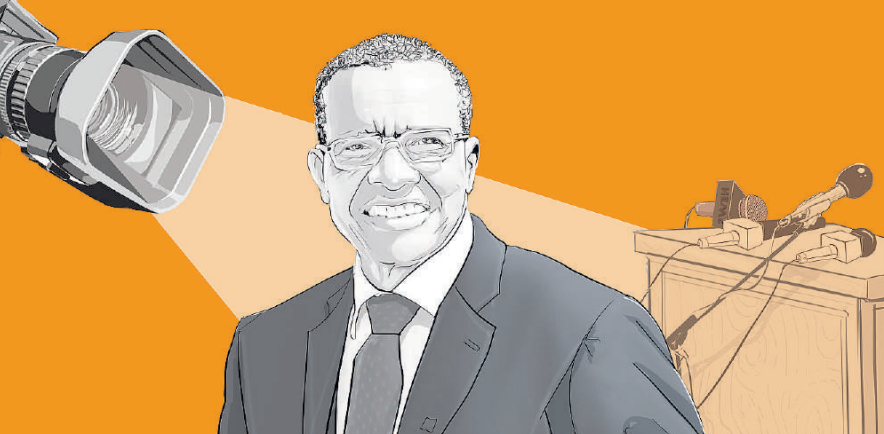
When former Chief Justice David Maraga quietly appeared in a Tanzanian courtroom earlier this week — the only prominent Kenyan present to witness the sham treason trial of opposition leader Tundu Lissu — the silence from Kenya’s press corps was deafening.
There were no front-page spreads, no prominent prime-time coverage, no panel discussions to analyse his intervention.
For a man who once nullified a presidential election in defence of constitutional integrity, this snub was very telling. Why did the media ignore him? The simple answer, I think, is because the Kenyan media has been hacked.
Not by foreign cybercriminals, but by a more insidious force: the entertainment-industrial complex of local politics. In today’s newsrooms, the algorithm is no longer code — it’s chaos.
The more outrageous the politician, the more likely they are to make headlines. Editorial judgment has been outsourced to the spectacle.
This explains why a seasoned jurist like Maraga, the candidate who has raised his head above the parapet on a platform of constitutionalism, fiscal discipline and judicial independence, cannot get a word in edgewise.
Meanwhile, former Deputy President Rigathi Gachagua remains a mainstay on our airwaves.
The bar for newsworthiness has sunk so low it’s practically subterranean. Let me be clear about who I am holding accountable here.
Not just media owners, though they bear responsibility for commercial incentives that prioritise ratings over editorial rigour.
I am also speaking about the reporters chasing after clout, the producers who book the same carousel of lazy pundits with rehearsed answers, the editors who wave through tired scripts and the radio and TV hosts who lurch on to mindless tropes about “kingpins” and “vote baskets”.
Together, they have become unwitting accessories to the collapse of our collective civic imagination. And I, dear reader, am hardly innocent.
In fact, I am more sinner than sinned against.
From 2019 to 2023, I helped set up and anchor a morning show. We set out to elevate political discourse, and in many respects, we did. But even we were seduced by the gravitational pull of political vandalism masquerading as analysis.
There were too many mornings when we booked guests for the heat they generated, not the light they could offer to the national discourse.
That is how I know how we got here: we have a media environment that feeds the public a steady diet of outrage, triviality and faux debates among the same dozen political players. Then we wonder why voter apathy is rising, why disillusionment festers and why our politics feels like a rigged game.
It is not because, to paraphrase stand-up comic Katt Williams, Kenyans have an “unnatural allegiance to mediocrity”, but because they are daily being fed a worldview through our local media that steadily shrinks the horizon of possibility to exclude all options other than an interchange set of work-shy politicians.
But if the media could shake off its current assumptions, it would recognise David Maraga as the credible alternative this moment demands. He is not flashy. He does not insult rivals or make outlandish promises he has no intention of fulfilling. What he offers is something infinitely more valuable: competence and integrity.
As Chief Justice, he endured vilification from the executive branch after he annulled the 2017 presidential election.
This was an act of institutional courage virtually unseen on the continent. He also consistently advocated judicial independence, respect for the rule of law and budgetary probity. Now he’s speaking again and not from a bench, but from a political platform. And the media owes it to the country to listen.
Do not get me wrong, this is not about the media endorsing Maraga or any candidate. It’s about recognising that our democracy is impoverished when serious voices are drowned out by a chorus of constant political buffoonery.
The shambolic state of national affairs currently is proof that when media airtime is monopolised by those who treat governance as performance art, we end up with a politics that is all theatre and no substance.
But it is not too late to course-correct. Kenya’s media houses must begin to reassert editorial judgment. That means giving space to credible voices, not just Maraga alone, but anyone proposing coherent, lawful visions for this country’s future.
It means resisting the clickbait impulse and refusing to be manipulated by politicians who have learned how to hack the media and game the system.
As part of my penance for contributing to this mess, and for the sake of my children and for my country, I intend to do my part in restoring integrity to the political discourse in our media.
That begins with demanding more from the media and giving credible alternatives like David Maraga their due.
The writer is a lawyer and media practitioner.













